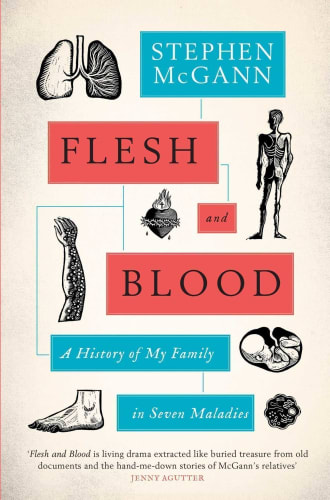As not only a successful stage and screen actor himself but also the youngest of the well-known McGann brothers from Liverpool (there is also a younger sister not "in the business"), Stephen McGann would be well-placed to write a showbiz autobiography, but he told audiences at this year's Edinburgh Book Festival that this didn't interest him.
Instead, he has written a kind of autobiography that says a great deal more about its subject than the usual disposable kiss 'n' tell backstage backbiting and tittle tattle celebrity paperbacks by focusing on the writer's lifelong obsessions as much as the events in his life.
From the age of 17, long before there was such thing as an online records search (or online anything), he became interested in genealogy. In the book, he traces his own family back to Ireland at the time of the Potato Famine, then their escape to Liverpool (many were trying to get to America via the English port), where they lived in appalling conditions and, though they were escaping death from starvation, were treated by the English as parasites and scroungers (sound familiar...?).
This is all well-researched and described in impressive detail, but this is more than a history book. Another of McGann's interests is science, in particular medical science, with which he became so fascinated while portraying Doctor Turner in the BBC TV series Call The Midwife (created by his wife, Heidi Thomas) that he completed an MSc in Science Communication with Imperial College London.
It's the medical science that forms the structure of the book, as the subtitle suggests, with seven chapters each named after a particular malady, but each begins with a double-definition: one of the medical issue it immediately suggests; the other of a wider symbolic meaning. So the first chapter "Hunger" defines itself as both "a very great need for food, or a severe lack of it" and "a strong desire for something", and "Heart Problems" is as much about love and essence as it is about a malfunctioning organ.
It's an unusual but very effective structural device—and one which you could imagine him regretting sometimes during the writing as he was trying to fit what he wanted to say within it. His science—and history—communication is compelling, but inevitably political, and not just in terms of the politics of the nineteenth century; his convincing arguments about the huge benefits to the working classes that came with the advent of free universal education and healthcare are still politically sensitive topics, as is the treatment of those escaping war and famine in other countries.
But what really grabs the reader is McGann's great skill as a storyteller, perhaps an actor's skill in taking a few disparate pieces of information and weaving a whole narrative around them. Some of the situations in which his ancestors found themselves are fascinating in themselves—Uncle Billy managed to survive a Japanese prisoner-of-war camp; great uncle James McGann was working in the boiler room of RMS Titanic when it hit the iceberg and survived; his father was one of the first to be sent across the Channel for the D-Day landings on what he was told by his commanding officer was a suicide mission—but McGann pulls you into the thrill and the horror of each situation.
If this all sounds historical and impersonal, it's far from it. McGann himself is everywhere in the narrative, excited at discovering the next fact about his kin, chatting to his relatives about their memories and expressing his views on what happened to them, but also adding anecdotes to the research about his own life from childhood to having a family of his own. It isn't a chronological history, but a picture is gradually built up of the writer, thoroughly contextualised in geography, history and class culture.
Some of the anecdotes are very personal, such as his account of when he and his brother Paul were at the Liverpool v Nottingham Forest match at Sheffield and the subsequent events that were later named after the stadium as the Hillsborough Disaster, or his traumatic story of when his wife nearly died soon after their son Dominic was born. Despite knowing the ending, these stories take the reader on a roller-coaster ride and are difficult to stop reading.
So while it may not be conventional as actors' autobiographies go, this social history combined with popular science and medicine that touches on some significant events of the nineteenth and twentieth centuries still builds up a very interesting picture of Stephen McGann, whether he intended it to or not.
